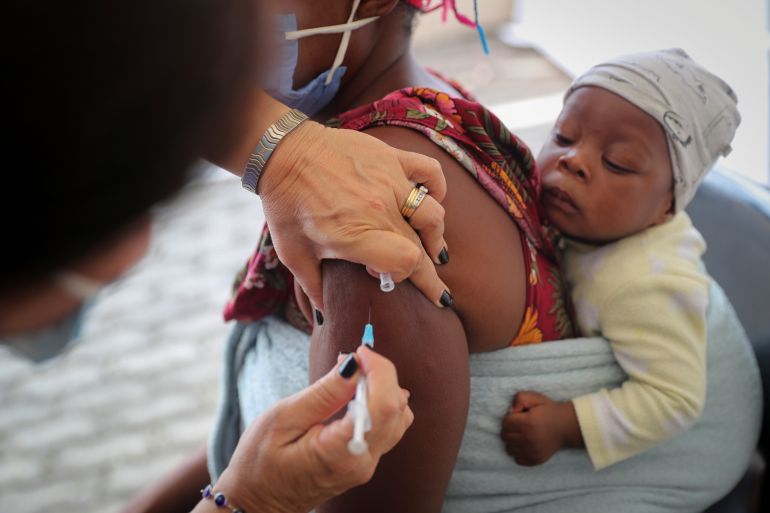COVID: South African study suggests Omicron milder than Delta
Study finds people diagnosed with Omicron in South Africa 80 percent less likely to be admitted to hospital.

A South African study has suggested there are reduced risks of hospitalisation and severe disease in people infected with the Omicron coronavirus variant versus the Delta one, though the authors say some of that is likely due to high population immunity.
Questions about Omicron’s virulence are at the heart of scientific and political debate in many countries, as governments grapple with how to respond to the spread of the variant while researchers race to understand it.
Keep reading
list of 4 itemsEurope braces for Omicron ‘storm’, US announces new measures
Biden says US to provide 500 million home tests as Omicron surges
WHO sounds alarm over rapid spread of Omicron
The study, which has not been peer-reviewed, found that people diagnosed with Omicron in South Africa between October 1 and November 30 were 80 percent less likely to be admitted to hospital than those diagnosed with another variant in the same period.
Among patients admitted in that period, those with Omicron had a similar chance of developing severe disease as those with other variants.
However, the study found that people who were hospitalised with Omicron in October-November were 70 percent less likely to develop severe disease than those admitted with Delta between April and November.
“Compellingly, together, our data really suggest a positive story of a reduced severity of Omicron compared to other variants,” said Professor Cheryl Cohen of the National Institute for Communicable Diseases (NICD), one of the study’s authors.
She said this was further reinforced by surveillance data showing significantly lower hospitalisations and deaths in South Africa’s current Omicron-driven wave of infections than in previous waves, although case numbers were much higher.
Cohen said that the study’s findings could likely be generalised to other countries in sub-Saharan Africa that also have very high levels of previous infection.
“What is unclear is whether the picture will be similar in countries where there are high levels of vaccination but very low levels of previous infection,” she said during a media briefing by a group of NICD scientists.
High population immunity
The study was carried out by a group of scientists from the NICD and major institutions including University of the Witwatersrand and University of KwaZulu-Natal.
The authors included several caveats and cautioned against jumping to conclusions about Omicron’s intrinsic characteristics.
“It is difficult to disentangle the relative contribution of high levels of previous population immunity versus intrinsic lower virulence to the observed lower disease severity,” they wrote.
An estimated 60 percent to 70 percent of people in South Africa have had a prior COVID-19 infection, Cohen said.
Paul Hunter, a professor of medicine at the UK’s University of East Anglia, described the South African study as important and said it was the first properly conducted study to appear in pre-print form on the issue of Omicron versus Delta severity.
But Hunter said comparing Omicron data from one period with Delta data from an earlier period meant it was hard to determine whether the lower hospitalisation rates were due to Omicron being less virulent or to population immunity having risen.
“To a certain extent, this does not matter to the patient who only cares that they won’t get very sick. But it is important to know to enable improved understanding of the likely pressures on health services,” he told the Reuters news agency.
Results of a study by Imperial College London released last week showed there was no sign that Omicron was milder than Delta, although data on hospitalisations remains very limited. It has not been peer-reviewed and published in a medical journal.
Peak may have passed in South Africa
There has also been a noticeable drop in new COVID-19 cases in recent days in South Africa.
Daily virus case counts are notoriously unreliable, as they can be affected by uneven testing, reporting delays and other fluctuations. But they are offering one tantalising hint – far from conclusive yet – that Omicron infections may recede quickly after a ferocious spike.
After hitting a high of nearly 27,000 new cases nationwide on Thursday, the numbers dropped to about 15,424 on Tuesday. In Gauteng province – South Africa’s most populous with 16 million people, including the largest city, Johannesburg, and the capital, Pretoria – the decrease started earlier and has continued.
“The drop in new cases nationally combined with the sustained drop in new cases seen here in Gauteng province, which for weeks has been the centre of this wave, indicates that we are past the peak,” Marta Nunes, senior researcher at the Vaccines and Infectious Diseases Analytics Department of the University of Witwatersrand, told The Associated Press.
In another sign that South Africa’s Omicron surge may be receding, a study of healthcare professionals who tested positive for COVID-19 at Chris Hani Baragwanath hospital in Soweto shows a rapid increase and then a quick decline in cases.
“Two weeks ago, we were seeing more than 20 new cases per day and now it is about five or six cases per day,” Nunes said.
But, she said, it is still very early and there are several factors that must be closely watched.